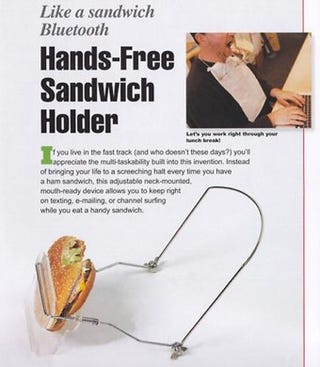Pay Attention
Pay Attention
Participants in a recent nutrition study were separated into two groups: One group ate their lunch without distractions; the other played solitaire on their computers while eating. The results: "Distracted individuals were less full after lunch, and they ate significantly more biscuits in the taste test than did nondistracted participants." The takeaway: Distracted eaters are more likely to overeat. Photo via The Daily What.
Drink a Glass of Water Before Eating
This advice is old enough that almost everyone's heard it before, but it's also backed by research: Drinking one or two glasses of water before you eat is an effective appetite control method that anyone can use. According to the folks who performed the study, "water may be so effective simply because it fills up the stomach with a substance that has zero calories. People feel fuller as a result, and eat less calorie-containing food during the meal." Basically you're giving a jump start to the feedback loop provided by your stomach's stretch receptors.
Eat Several Smaller Meals
Diets regularly recommend eating five or so small meals a day rather than three big meals. The major claim is that it boosts your metabolism (your body's digestion engine is always churning to digest), but it also helps level out your appetite a bit. This is easy enough to understand from personal experience�most of us are more likely to binge when we've let ourselves get very hungry. After denying yourself food for hours, your much more likely to go overboard when you do eat. The key is balance: You can only get away with eating several smaller meals during the day if you're spreading out your calories. LiveStrong has a nice little guide to getting your intake right.
As an added bonus, dieters who stick to several meals a day do a better job at sticking to their diet because the more consistent energy you get from your several meals actually helps you exert more self-control.
ExercisePay Attention
Participants in a recent nutrition study were separated into two groups: One group ate their lunch without distractions; the other played solitaire on their computers while eating. The results: "Distracted individuals were less full after lunch, and they ate significantly more biscuits in the taste test than did nondistracted participants." The takeaway: Distracted eaters are more likely to overeat. Photo via The Daily What.
Drink a Glass of Water Before Eating
This advice is old enough that almost everyone's heard it before, but it's also backed by research: Drinking one or two glasses of water before you eat is an effective appetite control method that anyone can use. According to the folks who performed the study, "water may be so effective simply because it fills up the stomach with a substance that has zero calories. People feel fuller as a result, and eat less calorie-containing food during the meal." Basically you're giving a jump start to the feedback loop provided by your stomach's stretch receptors.
Eat Several Smaller Meals
Diets regularly recommend eating five or so small meals a day rather than three big meals. The major claim is that it boosts your metabolism (your body's digestion engine is always churning to digest), but it also helps level out your appetite a bit. This is easy enough to understand from personal experience�most of us are more likely to binge when we've let ourselves get very hungry. After denying yourself food for hours, your much more likely to go overboard when you do eat. The key is balance: You can only get away with eating several smaller meals during the day if you're spreading out your calories. LiveStrong has a nice little guide to getting your intake right.
As an added bonus, dieters who stick to several meals a day do a better job at sticking to their diet because the more consistent energy you get from your several meals actually helps you exert more self-control.








No comments:
Post a Comment